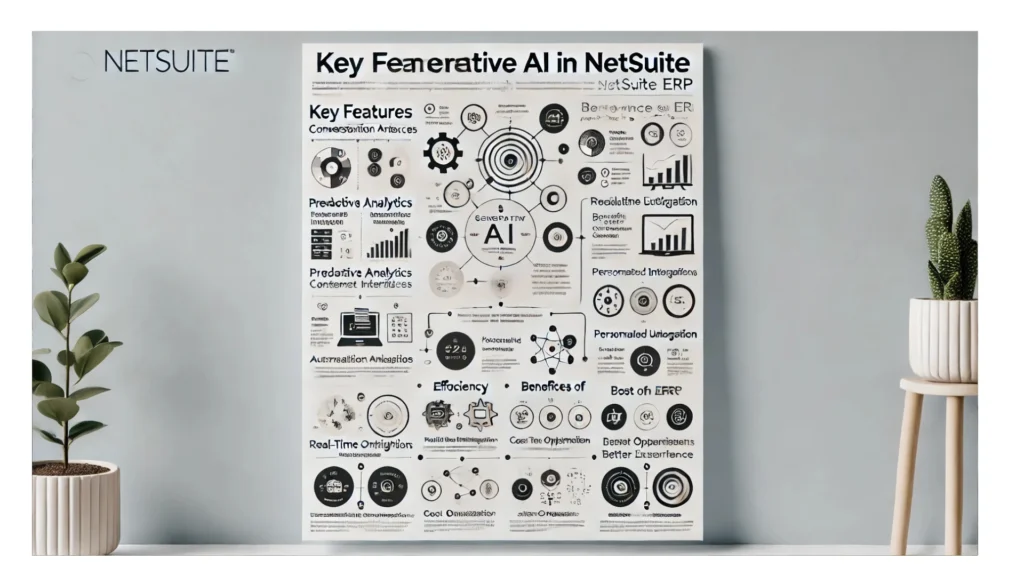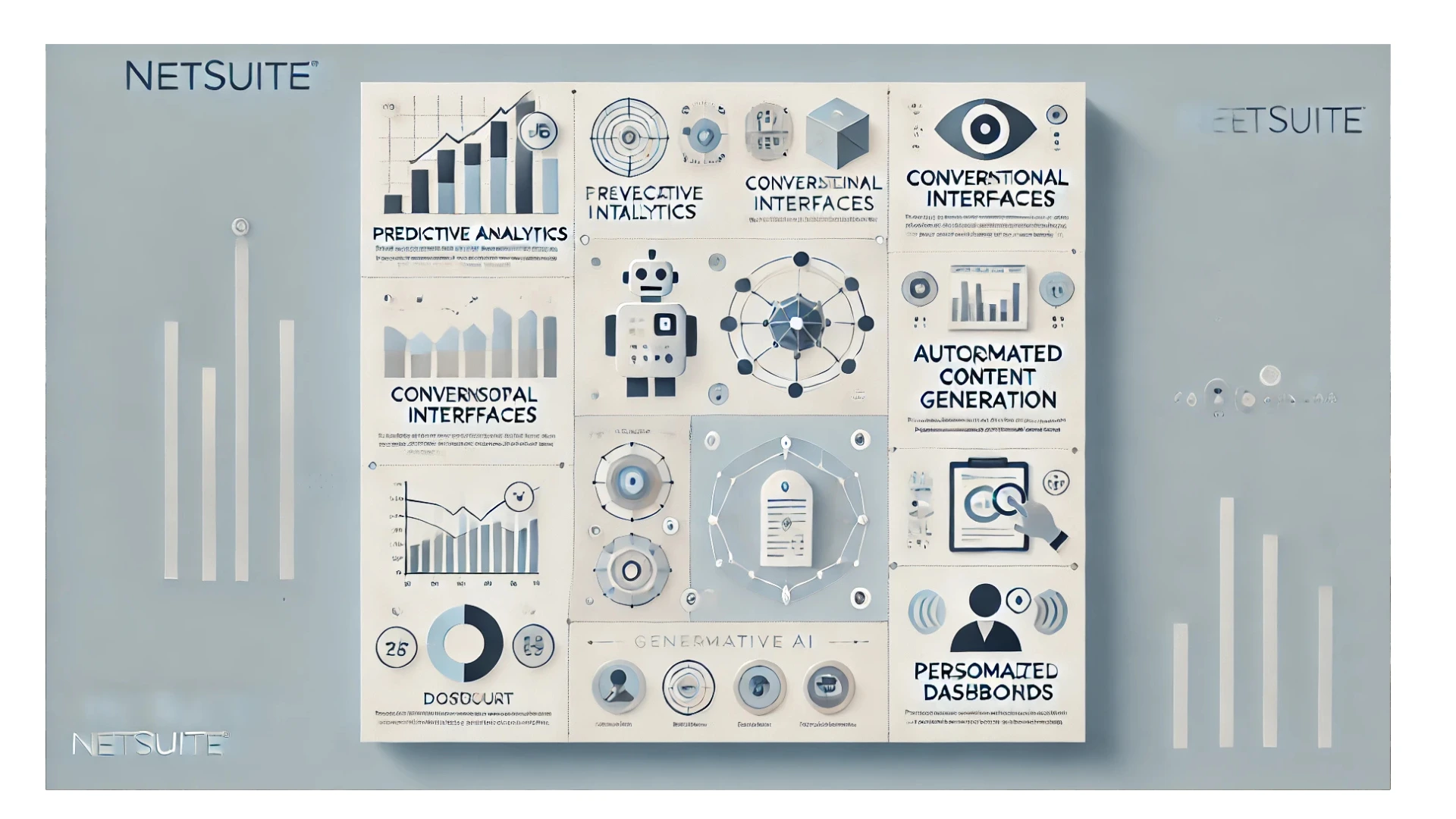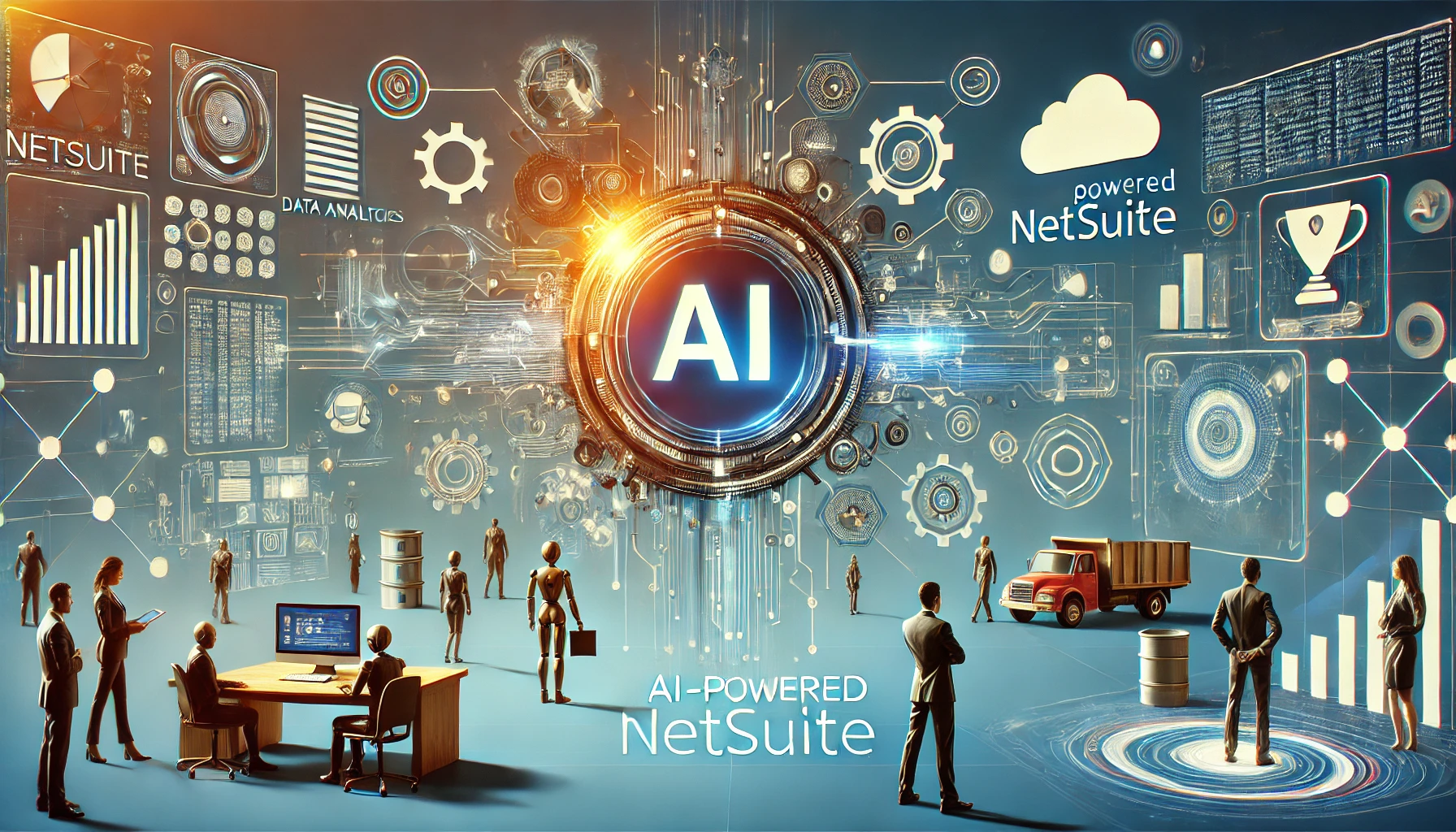In the fast pace of today’s business world, remaining ahead is simplified and facilitated through cutting-edge technologies applied in the streamlining of operations as well as unlocking new avenues for growth. NetSuite from Oracle has taken one bold step forward in expanding its generative AI capabilities within its ERP suite. Such efforts empower businesses to exploit AI-driven insights, automation, and personalization so that they optimize their operations and improve decision-making.
This blog explores what difference NetSuite generative AI advancements make in the functionalities of ERP and how companies can use such capabilities to maximum benefit.
Table of Contents
ToggleWhat does Generative AI mean in NetSuite?
Generative AI is artificial intelligence that uses highly sophisticated learning models about data to create content or make predictions. Unlike other kinds of AI tools, generative AI creates entirely new outputs, such as financial forecasts, marketing copy, and even automated workflows, based on existing patterns in data.
With generative AI being introduced in NetSuite’s business application, companies can now automate labor-intensive tasks, extract actionableness from complex datasets, and fashion user experiences more personalized to their needs. These advances made turn NetSuite from data management tools to intelligent assistants that are proactive in supporting business operations.

Features of NetSuite Generative AI Extension
- Predictive Analytics for Decision-Making: For example, the generative AI at NetSuite will examine past data using advanced algorithms so that patterns can be detected. For example, such technology can predict a business’s sales performance or even fluctuation in cash flow to enable businesses to be confident in their actions.
- Conversational Interfaces: NetSuite has now added conversational interfaces with NLP: through simple text or voice commands, a user can interact with the system. Gone are the days of clicking multiple menus or scrolling down to find specific fields. Instead, “What are this month’s sales projections?” may now be asked and have immediate insight.
- Automated Content Generation: Generative AI in NetSuite can provide personalized content, such as financial summaries, employee performance reports, and marketing campaigns. The feature saves massive time while being quite accurate.
Personalized Dashboards: NetSuite’s AI personalizes dashboards for every user, focusing on the most relevant key metrics and insights in accordance with their specific roles. This makes employees more productive as they can always get to action-ready data pretty quickly.
Benefits of Generative AI in NetSuite ERP
- Efficiency Through Automation: The time of the employees is freed from repetitive tasks such as data entry, report generation, and email draft creation in NetSuite AI capabilities. Besides time savings, it also reduces human error.
- Real-time Insights for Better Decision-Making: NetSuite’s generative AI capability gives real-time analytics and predictive insights to help businesses see into challenges and opportunities before they occur. Organisations can make data-driven strategies. This gives them the competitive edge.
Dealing with continuing growth in a business means more data and complexities in operations. With the generative AI in NetSuite, its performance scales immaculately so that consistent insightful analysis precedes even the size of an organization.
- Cost Optimization: The use of AI automation means less intervention is required, but added in this case is labor cost deduction and efficiency use of operations. Organizations are also prevented from wastage through demand prediction and optimization of inventory to ensure cost management better.
- Better User Experience: With NetSuite, the use of ERP tools by users with varying technical skills can be facilitated, and its adoption can then be widespread and effective, through personalized dashboards and conversational AI.
Adoption of Generative AI in Different Modules of NetSuite
- Financial Management: Generative AI Automates Financial Planning and Analysis. Generative AI identifies spending patterns, spots anomalies, and creates accurate cash flow forecasts. Organizations can now budget and deploy resources more accurately.
- Inventory and Supply Chain: The AI-driven tools in supply chain of NetSuite predict the fluctuation levels of demand, maximize and optimize the levels of inventory, and recommend adjustments for suppliers. Such features bring about improved operational efficiency and customer satisfaction due to reduced incidences of stockouts and overstocking.
- Sales and Marketing: Insights from AI systems provide sales teams with prioritized leads, whereas automated generation of content improves marketing efforts with strong, personalized campaigns. Such capabilities enhance customer engagement and revenue growth.
Human Resource: AI helps in the recruitment process by automatically applying candidates, generating job descriptions, and even scheduling interviews. AI also analyzes performance trends for employees, aiding HR teams in tailoring development programs and minimizing talent loss.
Practical Applications of Generative AI
- Intelligent Forecasts: A retailer uses NetSuite’s AI to predict seasonal trends on revenue and thus plan for the inventory and staffing levels in advance.
- Automated Compliance Checks: The AI of NetSuite monitors transactions for regulatory compliance instantly. This brings the discrepancy to their attention so that they can avoid costly penalties.
- Personalized Campaigns: A B2B company uses generative AI in formulating personalized email campaigns based on client behavior. Lead conversion rate is, hence increased.
- Time Real Demand Forecasting: A manufacturing company uses AI as a means of synchronizing the production schedules with the predicted demand. Downtime is, hence minimized and maximum usage of resources is ensured.
What makes NetSuite Stand out?
Oracle provides the most current cutting-edge AI infrastructure to NetSuite to ensure that NetSuite remains robust, continuously innovating, and capable of updating and scaling up in a straightforward manner, making it an advantageous element for businesses of any size.
Unlike the traditional ERP, whose use heavily depends on manual inputs, the AI capability of NetSuite proactively assists users in making data-driven recommendations and automation. NLP-powerful intuitive interfaces reduce the learning curve, and even non-technical people can fully leverage it.
Future of Generative AI in NetSuite
While this is only the tip of the iceberg of what generative AI can do within the framework of NetSuite, we can look forward to when it will be connected to the Internet of Things and blockchain. AI tools will become smarter, empowering businesses to dig deeper and automate complex processes.
More advanced generative AI models will now also be in place, which means increasingly accurate predictions, better personalization, and improved operational resilience, placing NetSuite at the forefront of ERP innovation.
Conclusion
The new generative AI features from Oracle NetSuite represent a game-changer for businesses that seek to maintain their competitive edge in a digital-first world. An organization at work with predictive insights that deliver and personalize user experiences will work strategically and efficiently through the different stages of automation.
Generative AI tools will become a ‘must-have’ for all companies interested in future-proofing their operations. If one wishes to better position themselves for success in the AI-driven future, innovations such as NetSuite’s are just the thing.



